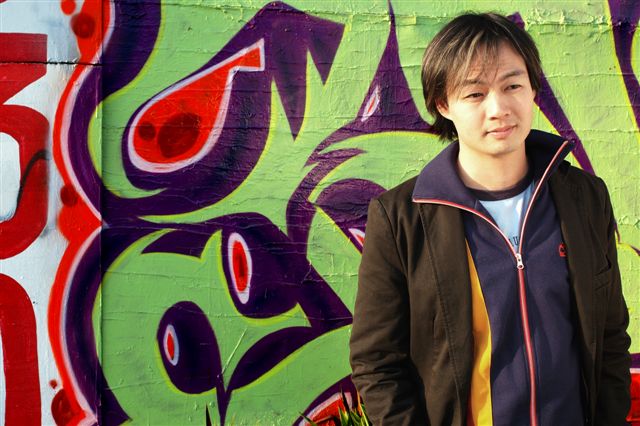Abbey Road Pt. 3
My day at Abbey Road started at 8:00 AM, when I showed up at the studio. Already the Royal Philharmonic Orchestra's massive truck was outside, and roadies were loading various large instruments into the studio, including the timpani, celeste, the battery of ethnic percussion I hired, as well as the mother of all taiko drums. (Here's a picture of me having a little fun with it!) Jeff had already shown up early to put all the musicians parts out on the stands, and John was already there making last minute adjustments to the microphones. My ace conductor Lucas Richman arrived shortly thereafter, and with that, we were ready to roll.
Jeff had already shown up early to put all the musicians parts out on the stands, and John was already there making last minute adjustments to the microphones. My ace conductor Lucas Richman arrived shortly thereafter, and with that, we were ready to roll.
The morning session started at 10:00 AM and lasted three hours. The afternoon session was four hours, starting at 2:00 PM. The final lineup I settled on was an orchestra of 85:

 3 Flutes
3 Flutes
--w/ piccolo, alto flute
3 Oboes
--w/ English Horn
3 Clarinets
--w/ Bass Clarinet
2 Bassoons
Contrabassoon
6 French Horns
3 Trumpets
2 Trombones
Bass Trombone
Tuba
Timpani
5 Percussion
Harp
Piano/Celeste
14 1st Violins
14 2nd Violins
10 Violas
8 Cellos
6 Basses
Our goal was to record, over the course of 7 hours, 46 minutes and 40 seconds of music....which is incredibly ambitious! (Why the rush? Frankly, I couldn't afford any more time.) We were able to accomplish this with few hiccups, mostly due to the amount of time I had spent in advance preparing every last detail. It wasn't a 100%-smooth process, though; because of a last-minute fiasco in the parts preparation, there were a number of missing notes in the horn parts that had to be corrected from the podium. All in all we wasted about 5 minutes with these problems, which doesn't seem like a lot on the outside; but considering every minute elapsed costs me about $150 in musicians salaries and studio rental, I was cursing my head off in the control room the whole time.
 Most people don't realize this, but orchestras that are contracted to do recording sessions don't actually rehearse the music in advance. They simply show up and read it on sight. It's actually quite incredible; these are some of the finest players in the world, and are capable of playing something nearly perfectly on first-read. However, that means that some adjustments that you need to make to the music will often catch you off guard on the day of the session. After every take, Lucas and I conferred on the podium and made minor changes to the sound. Most were things that can't easily be conveyed with written musical notation; for example, how short to make a staccato note, or how legato to play a melody.
Most people don't realize this, but orchestras that are contracted to do recording sessions don't actually rehearse the music in advance. They simply show up and read it on sight. It's actually quite incredible; these are some of the finest players in the world, and are capable of playing something nearly perfectly on first-read. However, that means that some adjustments that you need to make to the music will often catch you off guard on the day of the session. After every take, Lucas and I conferred on the podium and made minor changes to the sound. Most were things that can't easily be conveyed with written musical notation; for example, how short to make a staccato note, or how legato to play a melody.
 At 7:30 PM The Purcell Singers showed up to record the chorale to my Polish song, Hymn Do Trojcy Swietej (Hymn To The Holy Trinity). Directed by Mark Ford, this 45 member choir spent an hour recording first working on the pronunciation of the text (courtesy of a Polish coach), and then doing take after take trying to find the right sound.
At 7:30 PM The Purcell Singers showed up to record the chorale to my Polish song, Hymn Do Trojcy Swietej (Hymn To The Holy Trinity). Directed by Mark Ford, this 45 member choir spent an hour recording first working on the pronunciation of the text (courtesy of a Polish coach), and then doing take after take trying to find the right sound.
 We capped off the evening in exhilarating fashion. I've mentioned before in this blog the Maori tradition of the haka--well, at 9:00 PM four Maori guys came in and laid down take after take of chants, stomps, and body slaps for my closing Maori song Kia Hora Te Marino (May Peace Be Widespread).
We capped off the evening in exhilarating fashion. I've mentioned before in this blog the Maori tradition of the haka--well, at 9:00 PM four Maori guys came in and laid down take after take of chants, stomps, and body slaps for my closing Maori song Kia Hora Te Marino (May Peace Be Widespread).
10:00 PM, and 14 hours after I had arrived at the studio, we finished with a celebratory pint of Guinness. One of the longest and most exhausting days of my life...and hopefully the beginning of a great journey for me.
Labels: Album




